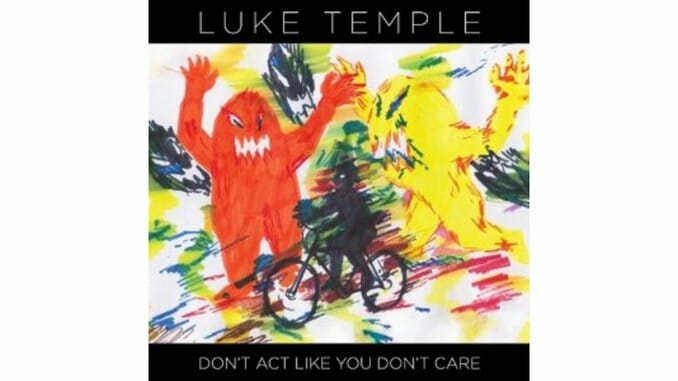
Don’t Act Like You Don’t Care, Brooklyn songwriter Luke Temple’s third full-length solo album, arrives at an odd time in his career. His second album with psych-pop darlings Here We Go Magic—the colorful, highly polished Pigeons—was released just last year, elevating his typically lo-fi bedroom recording technique to a series of exciting full-band destinations. Don’t Act Like You Don’t Care is a step in the completely opposite direction, downplaying the electricity of his band in favor of nine mostly stripped-down, acoustic meditations—recorded partially on a four-track and utilizing guest players only as occasional window-dressing.
Originally referred to as “The Country Record,” Don’t Act was recorded at the same time as Here We Go Magic’s self-titled 2009 debut—and when that album started generating buzz, Temple’s third solo album was shelved indefinitely. Context is everything: The tape hiss and overall lo-fi production values initially make Don’t Act feel like a backward enterprise, failing to build upon Pigeons’ kaleidoscopic scope. But in many ways, this is the most accomplished collection of songs Temple has put forth, even if it takes some time to account for the awkward adjustment.
The simpleminded “Country Record” tag is a bit misleading. The album’s first half is crammed with thoughtful, eclectic arrangements that aim skyward, even when the physical recording limitations argue otherwise. Opener “In the Open” is a ramshackle indie symphony, built from acoustic strum, cheap synth, brushed drums, the spark of an impatient violin. “Everything’s now in the open,” Temple sings, urgently pushing his voice toward its breaking point. It’s a moment of intensity Don’t Act never bothers repeating. “More than Muscle” is equally fantastic—and just as ambitious, even as the players scale back the volume. A buzzy lounge atmosphere is built from layered details: piano twinkles, percussive strikes, dribbles of cell-phone synth, soul guitar smatterings, a mountain of airy harmonies. There are echoes of Grizzly Bear’s Veckatimest, only had it been laid to tape in a dirty trailer.
With “How Could Muscle,” the album shifts directions into country-folk territory. Temple’s voice is commanding, occasionally squeaking from the intimidating heights he reaches on the twangy chorus, his acoustic strum augmented by a bath of guitar harmonics and faded choral voices. The highlights proceed: “Weekend Warrior,” with its revelatory chord changes, is downright haunting, Temple’s angelic falsetto floating above little more than cymbal sizzle and acoustic.
The album’s final four tracks are notably intimate: “Ballad for Dick George” thrives on the soothing quality of Temple’s voice—and that quality alone. In a way, the stark simplicity is a disappointment, arriving after the first half’s charming homemade collages (I almost fell asleep during the waltz-spiritual “You Belong to Heaven”). But there’s a calmness—a stillness that keeps even the sleepiest moments afloat, and it’s all held together by Temple’s singular voice: an instrument so naturally pleasant, you hardly need anything else.